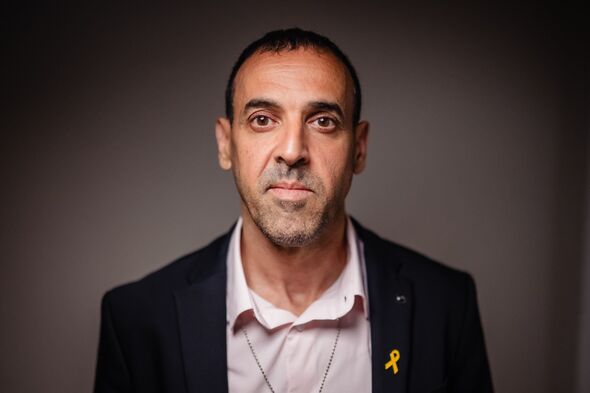Eli Sharabi, a survivor of the October 7, 2023, Hamas attacks, shared his harrowing experience of being kidnapped from his home in Kibbutz Be’eri. On that day, armed terrorists stormed the kibbutz, resulting in the tragic loss of his wife, Lianne Brisley, and their two daughters, Noiya and Yahel. As he marks the second anniversary of this traumatic event, Sharabi is releasing the English version of his book, Hostage, which chronicles his 491 days in captivity.
The day of the attack is etched in Sharabi’s memory. He recalls the terror in his family’s eyes as he was forcibly taken from them. Shortly after his abduction, masked assailants killed his wife and daughters in their home, a grim fate that his family’s British passports could not avert. Reflecting on that moment, Sharabi recalls praying, “Just not a tunnel, please, God, not a tunnel,” fearing the horror of being buried alive.
Sharabi was among approximately 250 Israelis kidnapped and taken across the border into Gaza. That day, at least 1,195 people were killed, including his family members. His older brother Yossi was also captured but was murdered after 100 days in captivity. Sharabi learned of his family’s fate only upon being reunited with his surviving relatives after his release on February 8, 2024, as part of a Hamas-Israel agreement.
Despite the physical and emotional toll of his ordeal, Sharabi emphasizes the importance of sharing his story. He states that writing has been a painful yet therapeutic process. “It represents an important part of my country’s history, and I am a small part of that now,” he explains. Although he has physically recovered, he still bears the effects of his captivity, having lost significant weight during his time in confinement.
Recently, Sharabi returned to the site of his former home, where his family was murdered, but felt unable to enter. “Not just yet,” he remarked, acknowledging the need for more time to process his loss. He is currently focused on campaigning for the release of the remaining 48 hostages still held by Hamas and remains surrounded by supportive family and friends.
The emotional journey of rebuilding his life is ongoing. “I have to start my life again. I am so lucky to be alive and to be a free man. Freedom is priceless,” he asserts. He plans to move into his own apartment soon, viewing this as a significant step forward.
Throughout his captivity, Sharabi shared his experience with various hostages, including survivors and those who did not make it out alive. He notably spent time with Alon Ohel, a 24-year-old musician still held by Hamas. “I did my best to look after him because you cannot expect the younger ones who didn’t have my life experience to have the tools to cope,” Sharabi noted, illustrating the solidarity formed among the captives.
The harsh conditions of captivity were severe. Sharabi describes enduring starvation, with his diet reduced to minimal portions, including half a pitta or a small bowl of pasta daily. He writes, “The hunger turns each man inward. Empathy dries up.” The hostages were subjected to humiliation and neglect, compounded by unsanitary living conditions. “I never knew the human body could collect so much filth,” he reflects, recalling the challenges they faced.
Born in Tel Aviv-Yafo, Sharabi moved to Kibbutz Be’eri at the age of 14. He met Lianne in 1995 while she was volunteering at the kibbutz, and they later married in the UK. Following his release, he reached out to Lianne’s parents, who have relocated to Wales. “It was so hard talking to them,” he admits, emphasizing their enduring bond.
Sharabi remains committed to raising awareness about the remaining hostages and continues to advocate for peace. He believes that many Israelis share his sentiment, expressing a collective desire to move beyond the trauma of war. Looking to the future, he hopes to become a private mathematics tutor for young people, determined not to let grief consume him. “I choose to move on and be positive, I choose light,” he concludes.
Hostage by Eli Sharabi is available for purchase, offering insight into a personal and national tragedy.
